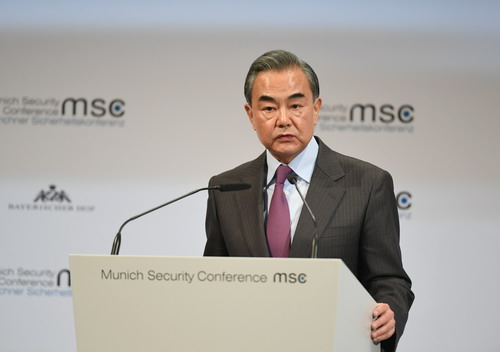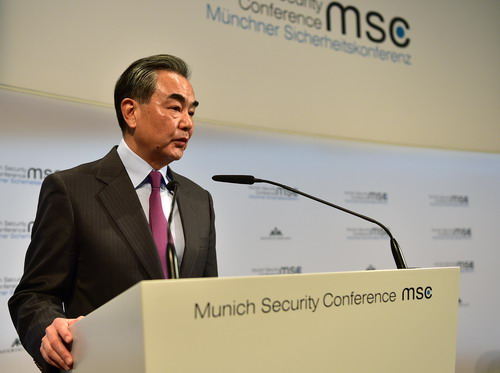
On February 15, 2020 local time, State Councilor and Foreign Minister Wang Yi attended the 56th Munich Security Conference and delivered a speech titled "Bringing East and West Together: In Shared Commitment to Multilateralism" in Germany.
In his speech, Wang Yi told the stories of united Chinese people's fight against the novel coronavirus pneumonia epidemic under the strong leadership of President Xi Jinping. Wang Yi expressed, the Chinese government's rigorous and thorough measures are paying off. China has full confidence, capacity and determination to defeat the epidemic. We are confident that China will enjoy more sound and sustainable economic development after the epidemic. The Chinese people will march on in more determined strides to usher in moderate prosperity in all respects, to eradicate absolute poverty, and to realize the rejuvenation of the Chinese nation.
Wang Yi said, the outbreak of the epidemic has once again reminded us that we live in a time when traditional and non-traditional security issues are entwined, and when local issues easily become global and vice versa. No country can prosper in isolation. Our countries' future is closely linked. Global governance and international coordination must be strengthened without delay. We must transcend the East-West divergence and the North-South divide, to truly build a community with a shared future for mankind.
Wang Yi put forward a four-point proposal on how to put multilateralism into action in a globalized world. First, to uphold multilateralism, we should pursue shared development. Multilateralism does not stand for putting any country above others. Instead, it advocates the equal right to development shared by all countries. If the West enjoys lasting prosperity and progress while the rest are mired in backwardness, multilateralism can never be truly implemented and the common progress of humanity would be impossible to achieve. China's modernization represents an inevitable trend of history. Given its national conditions, China will not copy the Western model. Given its cultural traditions, China will not seek hegemony even when it grows in strength. What we have chosen is peaceful development of our own country and mutually beneficial cooperation with the world. The path of socialism with Chinese characteristics, which has underpinned China's remarkable success, is brimming with vitality and leading to an even more promising future. China respects the choices of Western countries, and will draw on the experience of developed countries to work for shared prosperity. Likewise, the West also needs to eschew the subconscious belief in the superiority of its civilization and abandon its prejudices and anxieties regarding China. It needs to respect the choices of the Chinese people and accept and welcome the development and rejuvenation of a major country in the East, one with a system different from the West.

Second, to uphold multilateralism, major countries should set a good example. Major countries play a key role in and shoulder significant responsibilities for the success of multilateralism. Therefore, they need to behave in a way that befits their status. Instead of putting their own interests above those of others, they should care for the common interests of all countries; instead of carving out spheres of influence, they should work for an open world; and instead of provoking confrontation, they should work together to maintain world peace and stability. China will further strengthen strategic coordination with Russia. China will work with the US to find a way of promoting peaceful co-existence and mutually beneficial cooperation. And China will deepen cooperation with Europe across the board.
Third, to uphold multilateralism, we should uphold international norms. Multilateralism is antithetical to unilateral moves. Instead, it supports greater democracy in international relations based on international rule of law and justice. China has stayed true to the UN's founding aspirations and firmly defended the purposes of the UN Charter and international law. The mission of China's foreign policy is to promote world peace and common development. It is rooted in international law and the basic norms governing international relations and will not be swayed by turns of events. We pursue no selfish interests. Our policy, which is stable and consistent, can stand the test of history and has won the trust of others.
Fourth, to uphold multilateralism, we need to see the world as one community. President Xi Jinping put forward an important initiative of building a community with a shared future for mankind. The initiative of building a community with a shared future is inspired by the traditional Chinese philosophy that sees the world as one big family. It reflects profound thinking on the future of mankind and embodies a spirit of humanity; it points the way forward for global governance and represents the ultimate goal of multilateralism. It is a Chinese proposal on how to address today's challenges and has become an overarching goal of our major-country diplomacy with Chinese characteristics. The Chinese side is ready to work with various parties rise above differences in social system, history, culture and development stage, jointly preserve Mother Earth, our common home, and work for a prosperous global village in which we all have a stake.

